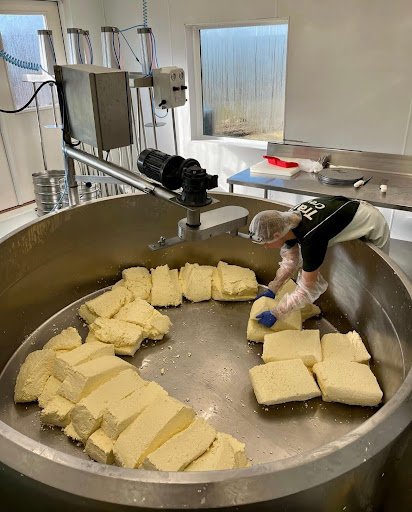Cato Corner Farm
Colchester, CT
Cato Corner Farm in Colchester, CT, has deep connections with Anne Saxelby, being the first dairy she ever worked at as an intern in 2003; it helped instill in her a love for domestic cheese. After art school, Anne met the people at Cato Corner Farm and began making raw milk cheese. An apprentice will have the opportunity to follow in Anne’s footsteps and work with this family-owned farm and their herd of 50 grass-fed Jersey cows. Cato focuses on producing the best possible milk to make the best possible cheese by selectively breeding their cows for high milk fat and specific proteins and by feeding them a seasonally rotated all-grass diet.
With this premium cow's milk, they can produce 10 types of raw, aged cheese. Styles range from soft, young gouda to hard, crystalline alpine to funky washed rinds, to bloomy to aged and fresh cheese. Apprentices will first spend 1-2 days working with the cows to understand how the care they receive can affect the cheese. They will work closely with the head cheesemakers to learn about curd size, time, temperature, pH, moisture, culture and rennet selection, choice of moulding forms, and care of the rind after production. The apprentice will learn how to add culture and rennet, how to cut and stir curd, how to hoop cheeses, and the proper sanitation to prevent unwanted bacteria growth.
Cato Corner Farm has a rich history rooted in a commitment to sustainable and humane farming practices. Established in 1997 by Liz MacAlister, who transitioned from raising goats and sheep to making cheese, the farm began with 13 cows and a vision for creating a value-added product to sustain the farm economically. Over the years, the farm has evolved under the management of Liz's son, Mark Gillman.
What sets Cato Corner Farm apart is its meticulously crafted, unique cheese recipes that reflect traditional styles and showcase the distinct flavor and terroir of their pastures. The farm's commitment to regenerative practices includes breeding cows for A2:A2 milk production, prioritizing grass-based diets, and high-quality genetics. The farm's commitment extends beyond cheese production, as evidenced by their two farm protection easements, ensuring the preservation of their land for future generations.



